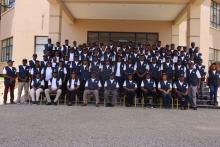AVoHC SURGE training for emergency responders underway in Malawi
Lilongwe ‒The Ministry of Health in Malawi with support from World Health Organization and Africa CDC, is currently training the first cohort of 63 emergency responders out of the country’s target of 200 to handle public health emergencies in Malawi and beyond.
AVoHC is a reference to Africa CDC’s initiative “Africa CDC’s African Volunteer Health Corps initiative.” SURGE is a reference to WHO’s initiative, “Strengthening & Utilizing Response Groups for Emergencies.” The AVoHC-SURGE training aims to ensure that African countries are prepared to respond to health emergencies and humanitarian crises within 24 to 48 hours from the time of the incident, and Malawi is among the 16 countries to benefit from the training so far.
Malawi has responded to several emergencies in the recent past including COVID-19, Polio, Tropical Storms, Tropical Cyclones, and the worst cholera outbreak in recorded history. After-Action Reviews (AAR) of the Cyclone Freddy and cholera responses were conducted recently and one of the key priority actions proposed from both AARs was strengthening response capacities.
This training therefore comes at an opportune time for Malawi to strengthen the existing structures to respond more efficiently and effectively to crises, limit the interruption of essential health services, minimize socio-economic disruptions, and contribute to enhancing global health security.
The training commenced on 9 October in Mponela and consists of four modules: Public Health Emergency Operating Center (PHEOC), Humanitarian and Health Cluster Coordination, Gender-Based Violence (GBV) and Prevention and Response to Sexual Exploitation, Abuse and Harassment (PRSEAH) in Emergencies, and Rapid Response Teams (RRT).
Addressing trainees in Mponela, WHO Representative Dr. Neema Kimambo expressed gratitude to the Government of Malawi for its heightened commitment to building resilient health systems in the country and pledged WHO’s support.
“I would like to assure you of WHO’s commitment to mobilizing resources to support the country in implementing the EPR flagship initiatives, including full implementation the AVoHC SURGE training. This initiative will translate lessons learnt from the pandemic into African driven solutions that reflect regional, national, and local needs,” she said.
Cognizant of the need to better prepare for, detect and respond to emergencies, the WHO African Regional Office (AFRO) and Africa CDC initiated the flagship strategies: Promoting Resilience of Systems for Emergencies (PROSE), Transforming African Surveillance Systems (TASS), and Strengthening and Utilizing Response Groups for Emergencies (SURGE).
Prior to this training, WHO worked with the government and partners in Malawi to develop and validate the roadmap for implementing the Flagship initiative after the introduction of the Flagship initiative through a joint WHO AFRO and country office scoping mission. The initiative translates lessons learnt from the pandemic into African driven solutions that reflect regional, national, and local needs.
Officiating the training, Mr. Ben Mbwana, Director of Administration speaking on behalf of the Secretary for Health voiced concern over the magnitude of the recent Tropical Cyclone Freddy and Cholera outbreak, with profound impact on the population, saying it underscores the urgency of bolstering the country’s public health emergency and disaster response capacities.
“The AVoHC SURGE training will produce AVoHC SURGE Rapid Responders, to form a critical component of our preparedness and response program capacities. Their ability to deploy within 48 hours of an emergency is a testament to the agility and preparedness we aspire to achieve,” said Mbwana.
Rev. Moses Chimphepo, Director of Preparedness and Response at the Department of Disaster Management Affairs (DoDMA), lauded the initiative, pointing out that having responders who are ready to be deployed will change the approach to disaster response from remote support of the Emergency Operation Centre to rapid support on the ground.
Malawi is recovering from a deadly cholera outbreak in history that claimed at least 1 768 lives with a high Case Fatality Ratio of 3%. To date, a total of 59 013 cases has been recorded.
